
When you make the decision to welcome a German Shepherd into your family, you may find yourself wondering how long you will really have with your new best friend, and what things you should prepare yourself for during the coming years.
On average, a German Shepherd’s life span is anywhere from 9-13 years of age. While this will differ from dog to dog, it is the standard to expect when factoring in size and the typical medical conditions that they may face.
In this article we will break down each part of The German Shepherd’s life stages, the common ailments they face, and ways to prolong your time with your beloved companion.
Click Here to Jump to a Section
The Average German Shepherd Lifespan
The lifespan of a German Shepherd will vary depending on each dog’s overall health and the care they receive throughout their life.
Though 10-12 years is the standard, there are ways to keep your Shepherd in the best shape possible, and help increase the likelihood of your furry friend to beat the standard age.
By feeding your pup a quality diet, staying up to date with their routine veterinary visits, and alleviating their pain as they age, you have all the tools you need to give your German Shepherd a long and happy life!
Below, we’ll go into detail on the multiple ways you can prolong your GSD’s life, and what to expect.
Life Stages Of The German Shepherd
When you are raising your German Shepherd, you will notice some major changes in maturity and personality. So you can best understand what to expect, below I have expanded on each stage of a GSD’s life:
The Juvenile Stage
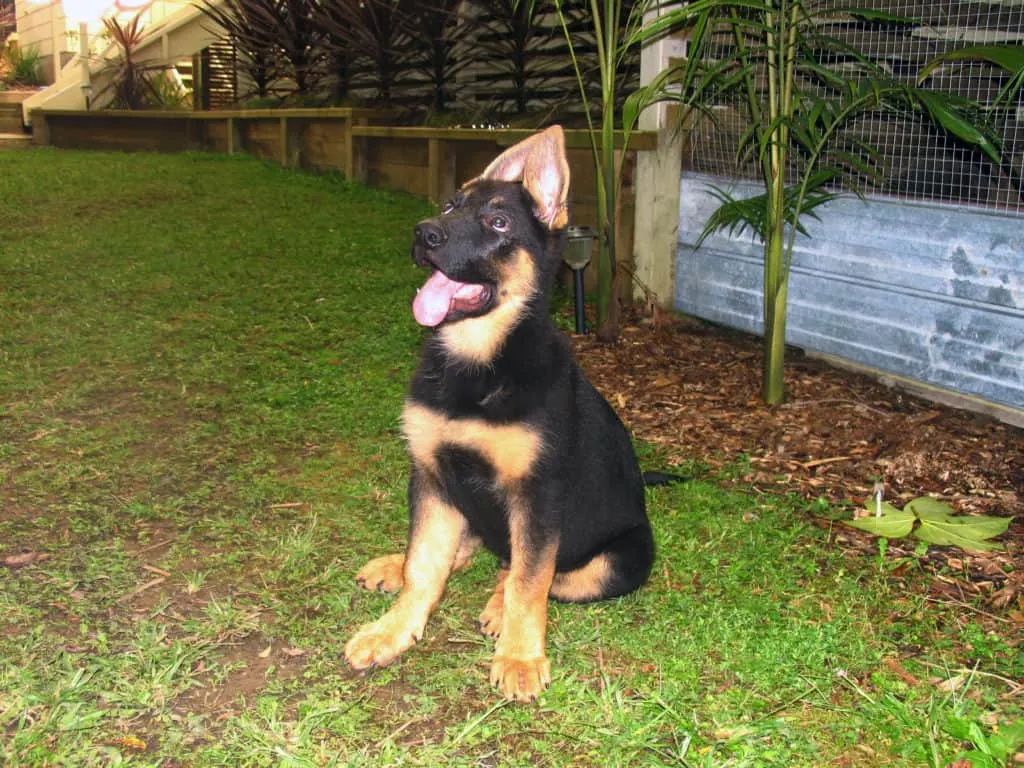
The juvenile stage is the time when most people choose to adopt their German Shepherd.
The age between 3 to 7 months of age is when your Shepherd is beginning to really take in the world around them. At this time they are most open to training, socialization, and structure you put in place for their everyday life.
This is also a time where they are packed full of rambunctious puppy energy!
Get ready for lots of playtime, but also an equal amount of puppy naps.
The Adolescent Stage

The adolescent stage in a German Shepherd is comparable to our time as a teenager.
The age between 7 months to 3 years is a time where your GSD will begin to really test the waters. This is the time where they begin to meet sexual maturity, so behavioral problems can begin to bloom.
If you plan to spay or neuter your GSD, this is the time to schedule it, as some behavioral issues can be alleviated with a desexing procedure.
Aside from their hormonal changes, is the energy level you should expect during this time period.
This will most likely your Shepherd’s most rambunctious period, so be prepared for daily exercise and play!
The Adult GSD
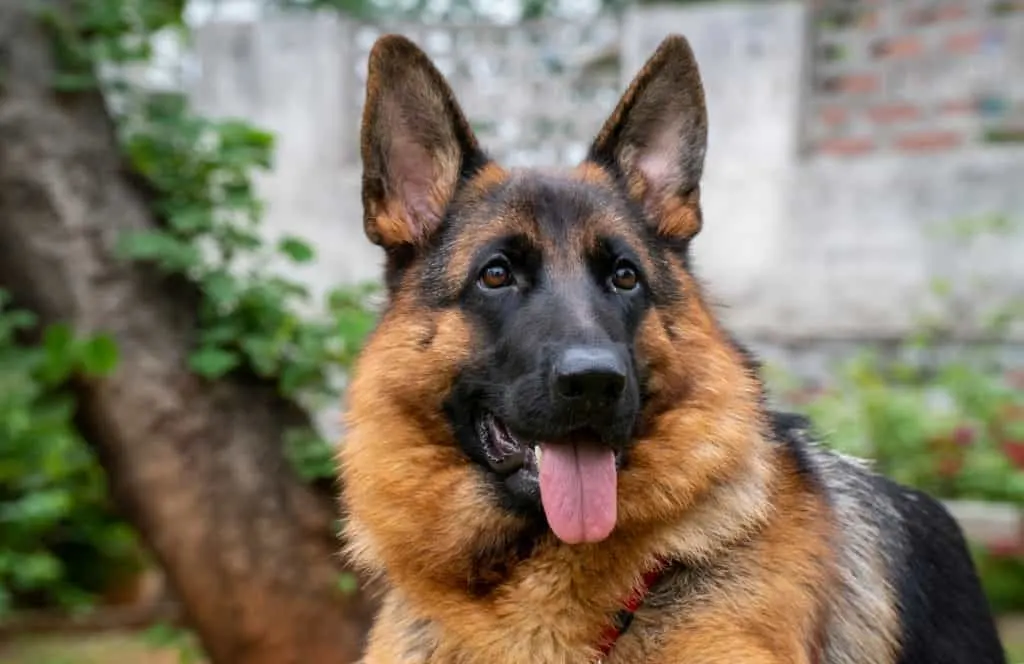
A German Shepherd is considered an adult once they reach 3 years of age.
This is the time period where you can finally breathe as your well trained Shepherd is now a more well behaved and conscientious dog.
You can now begin to enjoy a more calm version of your furry best friend.
The Senior Stage
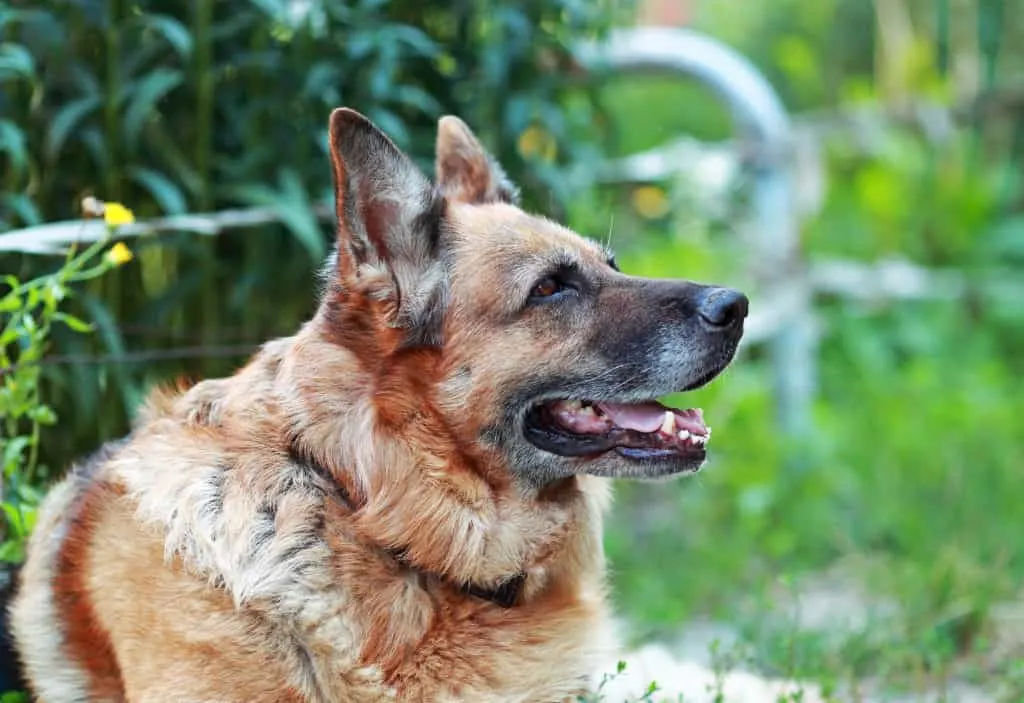
A GSD is considered a senior once they hit 7 years of age.
This is the point where they begin to slow down, and may experience some of the medical conditions that German Shepherds are prone to.
Once your pup reaches their senior years, you should begin to consider their daily comfort, and ways to help alleviate their daily struggles.
We will cover their senior years in detail, and specific ways to make their senior years more enjoyable further in this article.
Health Complications That Your GSD May Face
Just like any other breed of dog, German shepherds have a list of medical conditions that they are more prone to throughout their lives. By educating yourself on the possibility of these conditions, you can help reduce the risk of their occurrence.
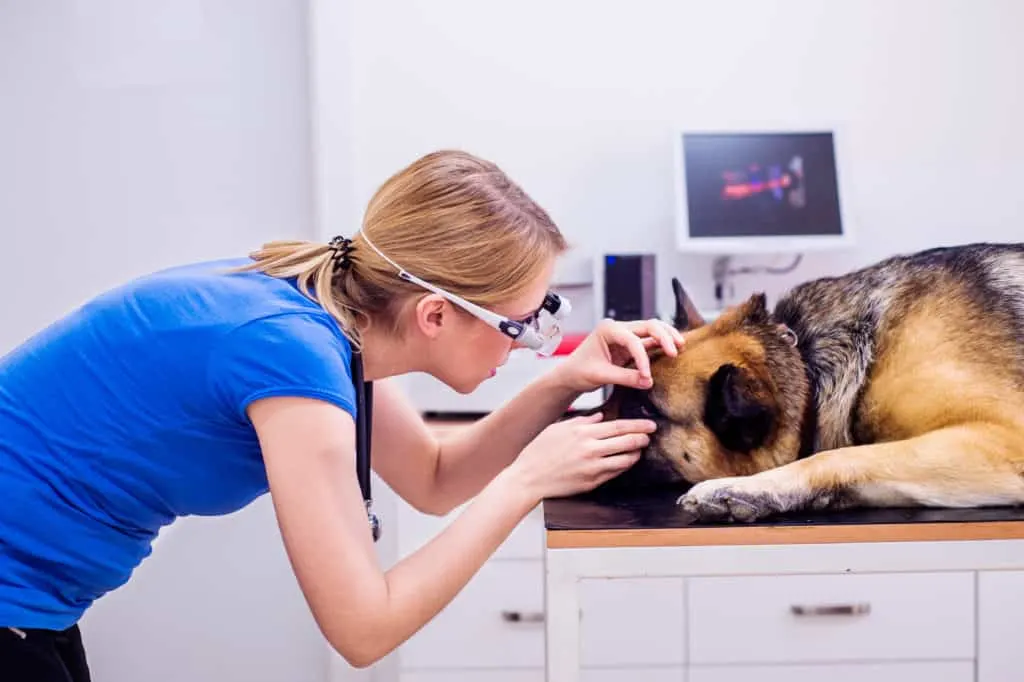
Hip and Elbow Dysplasia
Hip and elbow dysplasia is extremely common in German Shepherd dogs.
This condition is especially common in less than ideal breeding situations, as this is a condition that can be passed on.
Dysplasia is the displacement or abnormal formation of a joint, causing a dog discomfort as they continue to age.
When present in the hips or elbow joints, this can lead to pain when walking, slowing down with time, limping, lameness, and even complete debilitation in some cases.
Since this is such a serious condition that can cause so much pain, it’s recommended to clear any dogs of this condition when used for breeding.
Arthritis
Arthritis is a condition of the joints and bones that involved the wearing down of the cartilage between the joints.
This will lead to the rubbing and grindings of joints, causing extreme discomfort as the condition progresses.
While this can happen to any breed of dog, it is extremely common in large breed dogs such as the German Shepherd.
Bloat
Bloat is when a dog’s stomach flips on itself, causing food and air to become trapped in the stomach.
Since the stomach is flipped on itself, this also cuts off circulation to other parts of the intestinal tract. This is a serious condition, that if not resolved quickly, it is fatal.
This condition is so serious that it is considered the mother of all emergencies in veterinary medicine.
Dogs with bloat often experience wretching with no vomit production, weakness, rear leg weakness, distended abdomen, and collapse.
You can help to prevent this condition by limiting physical activity after a dog eats, and preventing your dog from eating too quickly with slow feeder bowls.
Epilepsy
Epilepsy is a seizure disorder that often affects dogs from 1 year of age and older.
This condition is characterized by the sudden onset of seizures and other neurological behavior.
Epilepsy can often be managed with daily medication and the reduction of stress in their environment.
Allergies
Allergies in German Shepherds can come in many forms. Dogs can experience allergies to the food they eat, the allergens in the air, and contact allergies.
Allergies often present as skin redness, skin irritation, constant itching, head shaking, hair loss, sores on the skin, and gastrointestinal symptoms such as gas and irregular stool.
Cataracts
Cataracts are the thickening of the lens on a dog’s eyes, making it more difficult for a dog to see.
This is common in dogs of all kinds as they age, but is particularly common in German Shepherds.
As a GSD ages, owners often notice them having more difficulty navigating around their house. They will often see them bump into furniture or structures around their home, and maybe even seem more fearful of their surroundings.
Though this condition will continue to progress as they age, it can be resolved with surgery if it becomes too debilitating.
Pannus
Pannus is an autoimmune disease of the eye that is extremely common in German Shepherds.
German Shepherds are the poster child of this condition, as it is seen so often in this breed.
Pannus causes irregular granulation tissue to form on the eye, causing vision disturbance, discomfort, and eventually vision loss when left untreated.
Dogs with this condition may have a cloudy appearance of the eye, eye irritation, eye swelling, pawing at the eye, or any other sign of eye discomfort.
Though there is no cure, it can be managed effectively.
Degenerative Disc Disease
Disc disease is common in all large breed dogs, and the German Shepherd is no exception.
Disc disease is the deterioration or changes in the discs of the spine, and can lead to pain and lameness in dogs.
While there is no way to prevent this condition, you can act swiftly when it occurs so you can make your dog more comfortable.
This condition is diagnosed by x-ray when GSD owners notice them slowing down, limping, crying out, having difficulties getting up, or refusing to get up.
Thyroid problems
The thyroid is responsible for important hormone production in dogs.
When the thyroid is not functioning properly a dog can experience weight loss, weight gain, change in appetite, hair loss, change in behavior, and a list of other concerning symptoms.
Thyroid problems can be diagnosed with routine blood work, and can be managed with daily medication.
Ways To Prolong Your GSD’s Life
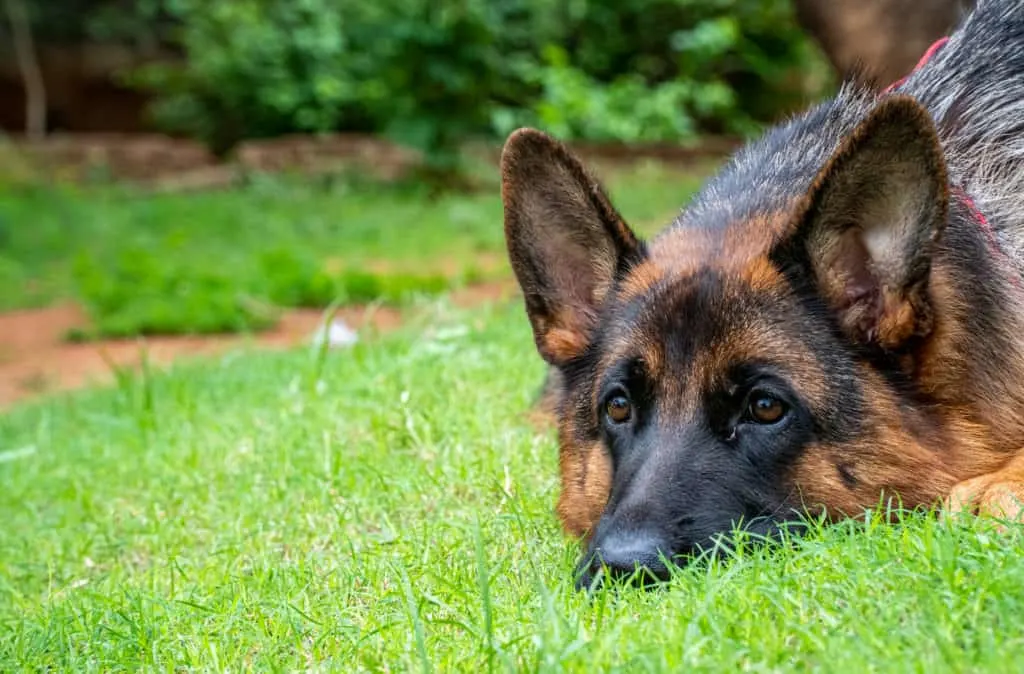
When you love a German Shepherd, you will look for any way to prolong the time you will have with your furry best friend.
Luckily, no matter what medical conditions are stacked against the breed, there are a number of ways to prolong your favorite Shepherd’s life.
Veterinary Tips
- Make sure to set up a proper vaccination schedule for your German Shepherd.
This includes three series of vaccines when they are puppies, and then yearly vaccinations as they age. This helps to protect them from infectious disease that they can be exposed to anywhere. - Make sure to always have your German Shepherd on monthly heartworm prevention.
It only takes one mosquito to infect your GSD with heartworms, so it is never worth the risk. - Make sure to attend routine veterinary visits.
By staying on top of yearly care, routine diagnostics, and under the close eye of a vet, you can catch any potential health risks early on. - It’s important to see your veterinarian for ANY health concerns.
No matter how small you may think they are, it’s always best to receive proper information and treatment from a professional.
The longer you wait for symptoms to resolve at home or with home care, the more difficult and expensive the condition will be to treat.
Feeding Tips
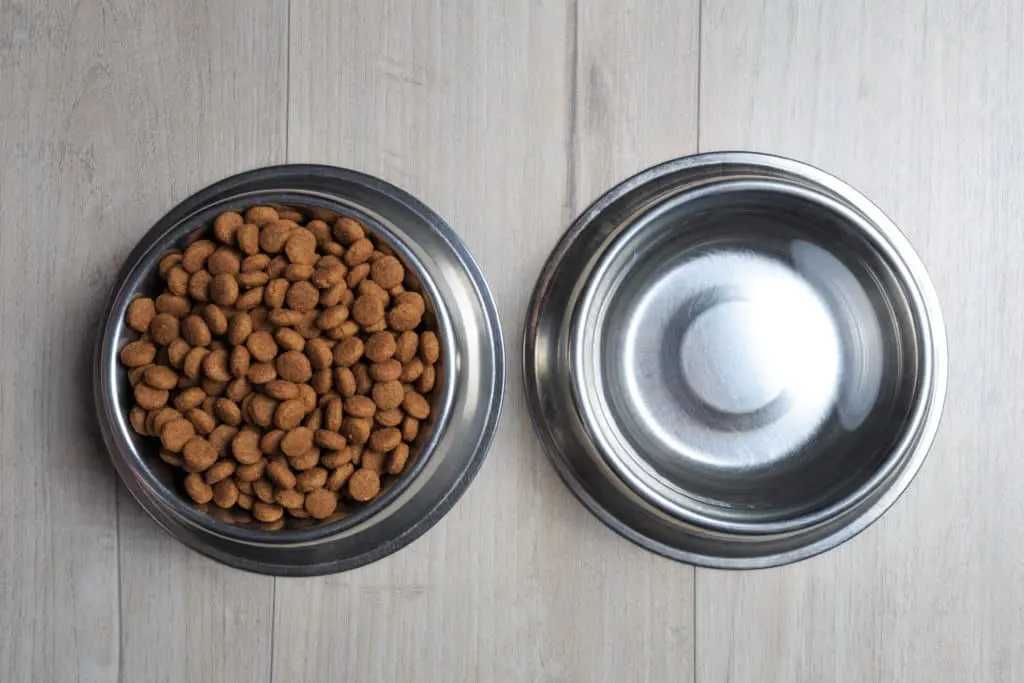
- Since German Shepherds are at risk of gastric bloat, it’s important to make sure that they don’t consume their meals too quickly.
If your dog likes to scarf down their food, then it’s recommended to feed them with a slow feeder bowl. - It’s important for your German Shepherds overall health to offer them a diet that’s nutritious and well rounded.
By feeding them quality ingredients, you are giving their body healthy fuel to continue to thrive from day to day.
If you are unsure if your current diet is ideal, you can always bring the bag to your veterinarian. - If your dog is experiencing any possible allergies to their food (hair loss, skin irritation, skin redness, excessive itching, etc.) then make sure to discuss food options with your veterinarian for dogs with allergies.
Most people choose to offer a diet without any poultry or gains as these are common food allergies.
Exercise Tips
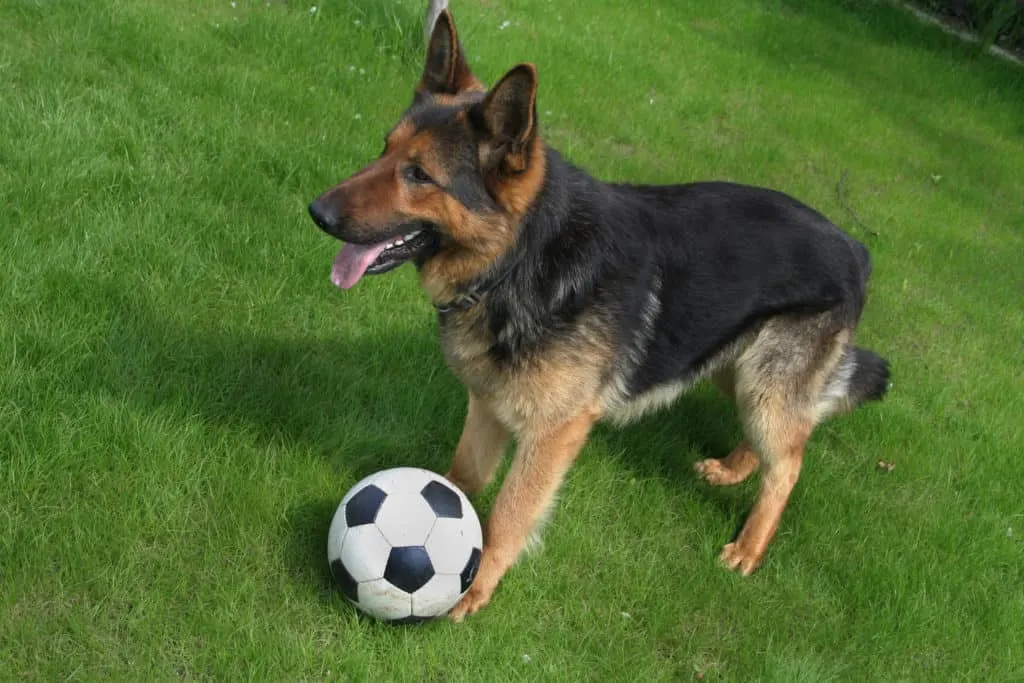
- Since GSD’s are at risk of arthritis and hip dysplasia, it’s important to keep them at a healthy weight.
Daily exercise can help to keep them slim and alleviate any unnecessary stress on their joints as they age.
Aside from their bone health is the benefit of a healthy weight and their overall health.
Just like in humans, when a dog is overweight, several organ systems can be negatively impacted. - Daily exercise is also necessary to keep your dog mentally and physically stimulated.
A bored dog is an unhappy dog, and can cause them to turn to destructive habits.
Daily exercise can help you bond with your Shepherd, help them release pent up energy, and result in an enjoyable and well-behaved dog.
Grooming Tips
- German Shepherds have a thick coat that benefits from daily brushing.
By brushing your Shepherd daily you can help to reduce the amount of stray hair in your home, and promote a healthy skin and coat. - Another important grooming aspect to remember is dental health.
Unhealthy teeth can result in mouth pain, dental disease, and bacteria in their bloodstream that can affect their organs.
We recommend daily teeth brushing, giving them dental chews as treats, and working with your veterinarian to establish a dental cleaning routine. - Trimming your dog’s nails monthly can help prevent unnecessary discomfort.
If their nails get too long they can experience difficulty walking around, pain when walking, and even infection from ingrown nails and nail breakage. - When it comes to bathing your German Shepherd, make sure to never bathe them more than once a month (ideally once every 3 months.)
Unless they participate in messy activities, it’s important to help them maintain the proper level of PH on their skin.
Frequent bathing can disrupt the natural oils on their skin and result in skin irritation.
Safety Tips

- Having a proper leash can help to prevent any unfortunate accidents when walking your dog.
Keeping them on a leash will keep them at your side, prevent them from running away, and can prevent any tragic accidents when they leave your side on a walk. - Proper identification, such as microchips and identification collars can help your dog find their way home if they get lost, as well as help them reach you if they are ever injured on an outdoor adventure.
- Practicing safe introductions around other dogs can help prevent dog fights and injuries from other dogs.
Remember to keep each dog on a leash during a first introduction, and to always introduce dogs in a neutral setting outside of their home. - Socialization is extremely important when it comes to your dog’s safety in and outside of your home.
By socializing your dog at an early age you can help to prevent negative interactions with other humans and animals.
How To Keep Your German Shepherd Feeling Their Best
When it comes to making your dog’s daily life comfortable, there are a number of ways in which you can help them feel their best. Some examples include:

- Feed them a healthy diet that nourishes their body.
- Keep them at a healthy weight.
- Give them a minimum of 30 minutes of daily exercise.
- Give them daily dental chews to keep their teeth healthy.
- Implement basic obedience training to improve their behavior and boost their confidence.
- Establish a routine veterinarian in which you can see yearly, or if any illnesses occur.
- Consider joint supplements to keep their joints and bones strong.
- Keep up with their daily and monthly grooming needs.
- Adjust your home to fit their needs as they age.
- Offer them plenty of mental and physical stimulation to keep them occupied.
How To Assist Your German Shepherd In Their Senior Years
Once your German Shepherd reaches their senior years, they will begin to experience more difficulties in their daily life.
During this time in their life, it’s up to us to alleviate their daily discomfort as much as possible. Some ways you can help your senior GSD include:
- Joint supplements: Joint supplements benefit every senior dog, but especially German Shepherds.
As your GSD ages, they will most likely experience arthritis and joint pain.
By giving them daily joint supplements you can help to repair the damage that has been done to their joints and eliminate some of their daily discomfort that comes with old age.
These supplements can also help to prevent further deterioration of joints, making their upcoming years more enjoyable. - Raised food and water bowls: Since German Shepherds are larger dogs, they will often have to bend down to reach their food and water bowls on the floor.
As they age, this action can become extremely difficult and can lead to neck pain and irritation of arthritic pain.
By raising their bowls off the floor, you are making their mealtime more enjoyable.
Some owners offer raised bowls from the start, since this is a more comfortable eating position for a large dog of any age. - Comfortable beds: Since our older dogs will experience more aches and pains as they age, they will probably spend a lot more time laying around then they use to.
By giving your GSD a comfortable bed to retire to, you prevent him from having to lay on the floor, or any other uncomfortable alternative.
The addition of a comfortable bed can also help to alleviate arthritic pain. - Rugs around your home: If you have wood floors or slippery surfaces around your home, you may notice your senior dog having a hard time gaining traction like they used to.
If this is the case, your German Shepherd can benefit greatly from the addition of rugs around your home.
Rugs can help them move around a bit easier and can help to prevent any slipping or falls that can lead to injury. - Routine veterinary care: As our dogs age, they will become more susceptible to medical conditions that threaten their health.
This time is more important than ever to make sure they have proper veterinary care, and stay on top of their routine diagnostics.
By diagnosing conditions early, you can help keep your GSD as comfortable and healthy as possible.
How To Know When Your GSD May Be Near the End of Life
Once your German Shepherd enters their senior years, you may begin to wonder how you will know that their end time is near.
While some dogs will pass on their own, there is a chance that we will have to make that difficult decision for our beloved companions.
If you are struggling with how to know when your German Shepherd is near the end, here are some things to look out for:
- Loss of interest: This can mean something different for each dog.
No matter what their favorite activities were before, (playing fetch, going on walks, chewing a bone, etc) if they longer show interest in things they once loved, they may be nearing their time. - Extreme fatigue: While senior dogs are more tired than they once were, they should still show interest in things like meals, going outside, or cuddle time with their favorite human.
If your senior Shepherd cannot be bothered to get up, that can be a sign. - Loss of appetite: Though older dogs can experience changes of appetite, they should never go a whole day without eating.
If you ever notice a lack of appetite in your senior dog, you should have them seen immediately. - Weight loss: Weight loss is not a disease, but a symptom to another cause.
If you notice weight loss in your senior dog, you should have them seen by your veterinarian to check for any serious problems. - Loss of bladder or bowel control: As our dogs age, they can begin to experience urinary and fecal incontinence.
Even if our dog’s don’t have the same mental processes as we do, there’s no way that this can be enjoyable.
Incontinence has to be uncomfortable, and maybe even degrading to our furry friends. - Breathing changes: There are a number of medical conditions that can cause breathing difficulties in our dogs.
This is a serious symptom, so make sure to see your veterinarian ASAP if you notice any changes in breathing in your German Shepherd. - Pain: If it seems like your senior German Shepherd is experiencing daily pain, even with the addition of joint supplements and veterinary care, it may be time to end their pain and talk to your vet about making that tough decision.
Though this is a terribly difficult decision to have to make, we never want to see our dog’s suffering. - Worsening of medical conditions: As your German Shepherd ages, their previously diagnosed medical conditions can begin to worsen.
If their illness begins to negatively impact their daily life, then it’s best to talk to your veterinarian about the next step.
The most important part of having a senior German Shepherd is your attempt to keeping them comfortable in the last stage of their life.
Make sure to stick to their normal routine as much as possible, allow them to decide what they’d like to participate in, let them rest, and talk to your vet about medical options to keep them comfortable.
Final Thoughts
Owning a German Shepherd is an incredible opportunity, so it’s important to make sure that you are doing everything possible to extend your time with your beloved furry friend. By understanding each stage of their life, you can assist in giving them an incredible life, and help make a number of lasting memories together!
